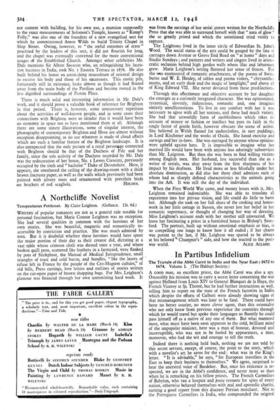A Northcliffe Novelist
Tempestuous Petticoat. By Claire Leighton. (Gollancz. 12s. 6d.) WRITERS of popular romances are not as a general rule notable for personal fascination, but Marie Connor Leighton was an exception. She had several qualities in common with the heroines of her own stories. She was beautiful, magnetic and romantically in- accessible by conviction and practice. She was .much admired by men. But it is doubtful whether these heroines would have spent the major portion of their day as their creator did, dictating at a vast table whose crimson cloth was dusted once a year, and where broken quill pens, scattered like feathers in a farmyard, were flanked by pots of Stickphast, the Manual of Medical Jurisprudence, small triangles of toast and cold bacon, and bundles, " like the layers of refuse left in France by the people' of the Cro-Magnon culture," of old bills, Press cuttings, love letters and outlines of stories written on the cut-open paper of brown shopping bags. For Mrs. Leighton's glamour was financed through her own unremitting hard work. It was from the earnings of her serial stories• written for the Northcliffe Press that she was able to surround herself with that " aura of glow " she so greatly prized and which the uninitiated tried vainly to capture.
The Leightons lived in the inner circle of Edwardian St. John's Wood. The social status of the arts could be gauged by the line of carriages down Avenue or Grove End Road on " at home " days and
Studio Sundays; painters and writers and singers lived in aristo- cratic seclusion oehind high garden walls where lilac and laburnum grew. Marie Leighton's setting flattered her sense of fitness. For she was enamoured of romantic attachments, of the poems of Swin- burne and W. E. Henley, of sables and parma violets, "chrysanthe- mums, and an early dusk and the magic of lamplight," and above all of King Edward VII. -She never deviated from these predilections.
Through this affectionate and objective account by her daughter she emerges as a curiously integrated character. She was opinionated, tyrannical, slovenly, industrious, romantic and, one imagines entirely unselfconscious. To live in any comfort with her it was necessary to agree with all her notions, and these had much variety. She had that unworldly form of snobbishness which takes no account of money or fashion or intellect but puts its faith in the . single factor of gentle birth, however obscure the scene of action. She believed in Welsh flannel for underclothes, in suet puddings, in Lord Kitchener and the works of Ouida. She hated exercise and earwigs and her in-laws. She was outraged by anyone whose opinions were upheld against hers. It is impossible to imagine what her married life would have been with anyone less adoringly 'subservient than Mr. Leignton. But then she was born to find willing victims among English men. Her husband, less successful than she as a writer of serials, was shut away from the first sharpness of her impact by his deafness. He lived more or less blissfully under her absolute domination, as did also her three chief admirers each of whom had as sharply defined characteristics as the animals going into the Ark. It was still the day of the individual.
When the First World War came, and money losses with it, Mrs. Leighton remained indomitable. She was able to translate all experience into her private vision, and life• could do little -to harm her. Although she took on her full share of the cooking and house- work in her little cottage in Sussex, she never lost her belief in her romantic supremacy, or thought of changing her way of dressing. Miss Leighton's account ends with her mother still unwearied. We leave her fascinating a priest in a furnished house in Bishop's Stott- ford. The portrait, built up without emotional emphasis or bias, is so compelling one longs to know how it all ended ; if her charm was potent to the last, if Mr. Leighton was spared to be always at his beloved 1` Chunnie's " side, and how she reacted to the post-


































 Previous page
Previous page